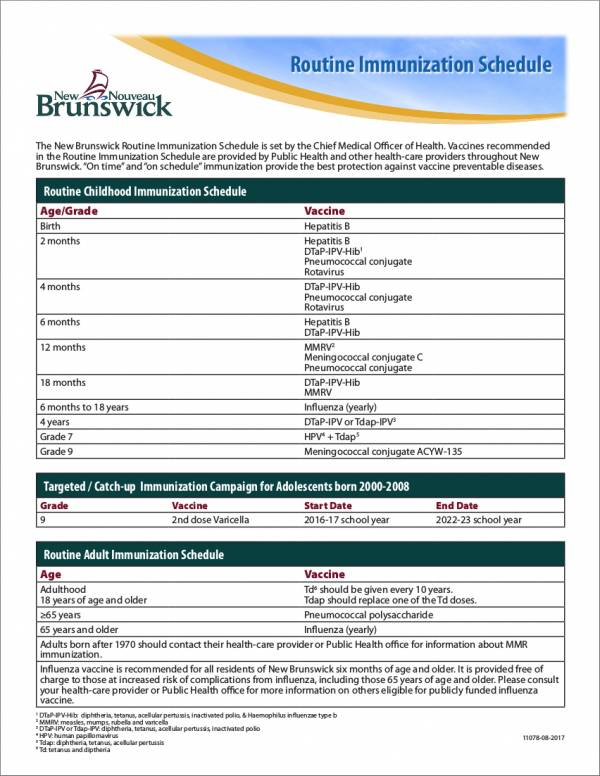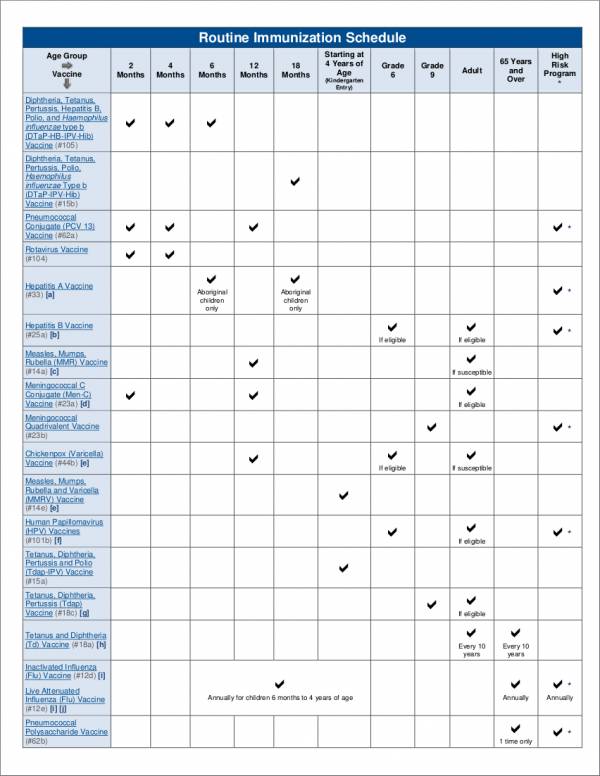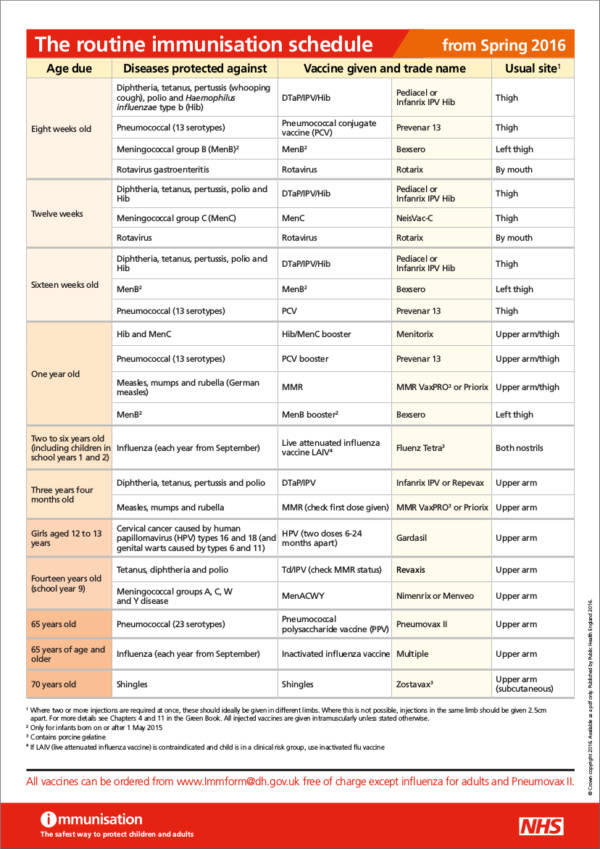
Age 7–years: routine interval : months (a dose administered after a 4-week interval may be counted) Age years and older: routine interval: 4–weeks (minimum interval: weeks) The maximum age for use of MMRV is years. Any dose not administered at the recommended age should be administered at a subsequent visit, when indicated and feasible. As such, it provides an overview of vaccine recommendations across the lifespan, including both primary series and booster doses. These parent-friendly schedules outline what vaccines are recommended at which ages.
Routine Vaccines for Children and Adolescents. Strengthening routine immunization. Between through years of age, your child should visit the doctor once a year for check-ups. See full list on canada. Administration of vaccines in accordance with the immunization schedules summarized in the following tables will provide optimal protection from vaccine preventable diseases for most individuals.
However, modifications of the recommended schedule may be necessary due to missed appointments or illness. In general, interruption of an immunization series does not require restarting the vaccine series, regardless of the interval between doses. Individuals with interrupted immunization schedules should be vaccinated to complete the appropriate schedule for their current age.

Refer to Timing of vaccine administration in Part and vaccine-specific chaptersin Part for additional information. Contact Our Pharmacist Today To Learn Which Vaccines Are Right For You. The guidance calls for countries to prioritize routine immunization of children in essential service delivery, as well as some adult vaccinations such as influenza for groups most at risk. If immunization services must be suspende it recommends urgent catch-up vaccinations as soon as possible, prioritising those most at risk.
Learn about which dog vaccinations every canine should have and which ones are based on lifestyle. No matter your dog’s age, vaccinations should be a part of their health care routine. Mexico immunization comparison charts.

Schedules include information on primary infant immunization , adolescent and adult vaccination, as well as vaccines for travellers. The schedules can be viewed online or can be downloaded and printed. Find your search on search. The second and third doses are usually given at 1-months and at 6-months of age.
The CDC recommends pregnant women receive some vaccines , such as the measles, mumps, rubella (MMR) vaccine a month or more before pregnancy. The Tdap vaccine (to help protect against whooping cough) is recommended during pregnancy. Other vaccines , like the flu shot, can be given before or during pregnancy, depending on whether or not it is flu.

Similar to last year, the cover page includes a table with an alphabetical list of vaccines , approved abbreviations for each vaccine, and vaccine trade names. A different schedule may be needed for high-risk individuals, individuals NOT previously immunized or, if one or more doses of a vaccine are missed. Talk to your health care provider for more information about immunization. Vaccines May Prevent The Spread Of Potentially Harmful Disease. Click To Learn More Today.
Learn About How Vaccines Could Protect The Health And Well-Being Of Individuals. Most people think of these as childhood vaccines that you get before starting school, but CDC also recommends routine vaccines for adults (for example, flu vaccine and tetanus booster shots). Additional vaccines may be recommended for certain children at high risk. Your pediatrician will advise you about the need for these vaccines as well as provide a revised vaccination schedule for those patients who miss receiving a vaccine at the recommended time frames.
Vaccinations are offered to babies, children and adults to protect. This table summarizes the current routine vaccination schedule for infants and children in all provinces and territories across Canada. Immunization Schedule Immunisation. You may think of these as the childhood vaccines that you get before starting school, but some are routinely recommended for adults, and some are recommended every year (like the flu vaccine) or every 10.
ROUTINE IMMUNIZATION NEEDS GREATER ATTENTION. One school of thought holds that investments to achieve broad health system strengthening (HSS) goals will, like the tide, raise all boats and so contribute to the strengthening of routine immunization (RI). The proponents of this theory use a preferred metric of reduced child mortality from all causes. Most of the recommended childhood immunizations are -1 effective, according to the CDC.
Giving insight in the vaccine schedules in all countries of the EU, provided by the European Centre for Disease Prevention and Control (ECDC).
No comments:
Post a Comment
Note: Only a member of this blog may post a comment.